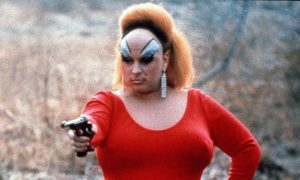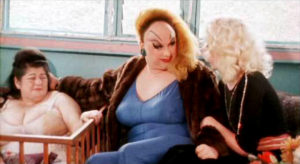STUDIO: Criterion | DIRECTOR: John Waters | CAST: Divine, David Lochary, Mary Vivian Pearce, Mink Stole, Danny Mills, Edith Massey, Channing Wilroy, Cookie Mueller
RELEASE DATE: 6/28/22 | PRICE: Blu-ray $39.95
BONUSES: two audio commentaries featuring Waters, from the 1997 Criterion laserdisc and the 2001 DVD release; new conversation between Waters and filmmaker Jim Jarmusch; tour of the film’s Baltimore locations, led by Waters; deleted scenes, alternate takes, and on-set footage.
SPECS: NC-17 | 93 min. | Comedy | 1.66:1 widescreen | monaural
It’s been a half-century since John Waters’ “exercise in poor taste” (per the movie poster) was released, and one is left to wonder if “one of the most vile, stupid and repulsive films ever made” (per Variety) still has the power to shock viewers.
The answer is a qualified yes, as several elements in 1972’s Pink Flamingos that used to provoke and disturb are now commonplace (lesbian couples who want to have children, an “adult baby,” hair dyed with bright Crayola colors). And yet there are still a number of moments that are certain to shock viewers who only partake of family-friendly entertainment: among them, a sex scene where a live chicken is situated between the participants, a “mother” (Divine) orally gratifying her “son” (Danny Mills), and a press conference for a tar-and-feathering/murder event. In his vintage “shock” period (1969-’77) Waters loaded his films with so many outrages that they will always have the power to shock at least someone in the audience.
The thing that has made the films so durable as cult entertainment, though, is that each of the “golden era” Waters films were set in a world all their own, where traditional values were turned on their head (ugliness = beauty, criminal = glamorous, filthiness = divinity). Added to this are the over-the-top, never-in-Hollywood charms of the “Dreamland” players, the group of Waters’ friends/Baltimore residents who became cast members of his wildly offbeat comedies.
Pink Flamingos boasts the full ensemble of Dreamlanders. Several of these people were “found objects” in Waters’ universe, with the ultimate example being former barmaid Edith Massey, whose line readings were otherworldly and who gave a special, lovable quality to her role as the “Egg Lady” here.
The other end of the spectrum were the higher-register masters of camp dialogue, represented by Mink Stole and the late David Lochary as the evil Connie and Raymond Marble, who work to steal Divine’s crown as the “filthiest person alive.” Both performers ranked with the best of Warhol/Morrissey’s “Factory” chat-aholics and the Kuchar brothers’ Bronx heroes and starlets. (Whenever one sees a camp performance in a Troma movie or some other indie picture, the actors are almost always imitating the delivery of the Waters-Morrissey-Kuchar school of camp acting, whether they know it or not.)
 Of course, Divine is the focus of the most attention in the film. The flashy, trashy side of Waters’ films sometime obscured just how talented Divine was as a comedic performer and how he (Waters stresses in the supplements that there “were no pronoun battles” — Divine preferred to be called “he” when offscreen) positively shone in Waters’ work, becoming one of three icons in the Seventies midnight movie pantheon, along with Tim Curry’s “Frank-N-Furter” and Jack Nance’s “Henry” in Eraserhead.
Of course, Divine is the focus of the most attention in the film. The flashy, trashy side of Waters’ films sometime obscured just how talented Divine was as a comedic performer and how he (Waters stresses in the supplements that there “were no pronoun battles” — Divine preferred to be called “he” when offscreen) positively shone in Waters’ work, becoming one of three icons in the Seventies midnight movie pantheon, along with Tim Curry’s “Frank-N-Furter” and Jack Nance’s “Henry” in Eraserhead.
The other element that Waters exhibited from Multiple Maniacs (1970) to Desperate Living was memorably insulting dialogue. Pink Flamingos contains some of Waters’ most succinct verbal abuse. Example: “There’s just two kinds of people: my kind of people and assholes. It’s rather obvious which category you fit into.”
The film also offers a brutal verbal manifesto of sorts in the “press conference” scene when Divine is asked for her political beliefs. She responds: “Kill everyone now. Condone first-degree murder. Advocate cannibalism. Eat shit! Filth are my politics — filth is my life!” The pre-punk quality of the dialogue becomes even more remarkable when one realizes that Pink Flamingos was added to the National Film Registry by the Library of Congress in December of last year.
This Criterion release includes two new supplements and a host of older ones from previous DVD (and even Criterion laser disc) releases. One is surprised to see both a 25th anniversary video where Waters introduces snippets from deleted scenes and the full scenes themselves as another extra. Although sequences with a neighborhood gossip named “Patty Hitler” (Pat Moran, who went from being a Dreamlander to serving as casting director for shows like The Wire) are amusing, the best moments feature Divine dictating her memoirs of filth, and the Marbles complaining about nature.
The full-length 1998 documentary Divine Trash by Steve Yeager covers a lot of ground, offering a biography of Waters that then becomes a making-of doc on Flamingos. Waters’ childhood practice of putting on puppet shows (for cash) and his love of staging car accidents with his toys are likened to the behavior in his later scripts.
The documentary’s segment on underground film provides a solid depiction of the allure that NYC’s indie filmmaking scene held for Waters in Baltimore, so much so that it could have been spun off into its own doc. A vintage interview finds Waters being asked who his idols are — his fascination with the underground goes out the window as he quickly responds, “Russ Meyer and the Manson girls.”
Divine Trash goes into much detail on Pink Flamingos. The cast and crew talk about the making of the film, from initial shoot to the moment that it became a midnight cult movie. Perhaps the most interesting fun fact imparted about the film’s shoot is that there was no kind of food provided on-set — those working subsisted on “cigarettes and speed.”
There are also two different audio commentaries that Waters did for the film, from the 1997 Criterion laser disc and the 2001 DVD. He offers different information in both commentaries, but one common theme is mentioned — the “terrorist” aspect of the film’s plot. He notes that he regrets dedicating the film to “Sadie, Katie, and Les” (the aforementioned Manson girls), but also declares that he and the Dreamlanders would attend riots (he never calls them “protests,” just riots) because they were the most exciting places to be during the late Sixties. (Although he also maintains he went “to the riots to cruise.”)
 He asserts that his political heroes at that stage were “Yippies, not hippies” and that Abbie Hoffman’s theatrical political stunts appealed to him. He emphasizes that the first audience to enjoy his movies were bikers who knew, much like John and his friends, that “they were bullshit, those [good] vibes” talked about by hippies.
He asserts that his political heroes at that stage were “Yippies, not hippies” and that Abbie Hoffman’s theatrical political stunts appealed to him. He emphasizes that the first audience to enjoy his movies were bikers who knew, much like John and his friends, that “they were bullshit, those [good] vibes” talked about by hippies.
One of his best self-analyses in the commentaries finds him stating that anger fueled his filmmaking in the Seventies, and that Pink Flamingos is about a great “American topic, competition.” He also maintains that all his films somehow reflect on fame and its underside. Finally, he notes that he sought an NC-17 from the MPAA for the latter-day re-release of Flamingos, since he’s heard from fans of Hairspray and his later family-friendly pics (Cry Baby, Pecker) who would rent Flamingos and be horrified when they showed it to their families by mistake.
At one point in the 1997 commentary he reveals that a lot of the humor in Flamingos was the product of his constantly smoking pot at the time he wrote it. He then notices that the people in the control booth recording his commentary are laughing, adding “They’re experienced with pot!”
Interestingly, Waters doesn’t acknowledge that he replaced six pieces of music in Flamingos from the time of the 1997 laserdisc release onward, presumably for licensing reasons. This is an odd omission, given that he notes in the commentary for the Criterion release of Multiple Maniacs that he replaced a bunch of music from the original version of that film for the same reason.
The two supplements shot for this release show Waters in his mellow elder statesman role. The first is a travelogue in which he visits the locations used in the film. The house he lived in with Mink Stole as a roommate is now owned by a drummer (who is aware the film was shot in his house but hasn’t been interested enough to watch it). The land on which Divine’s mobile home was situated is now owned by an astronomer who believes that the remnants of the mobile home (which is burned down in the film) were buried underneath the land that is now his lawn.
The other original supplement is a half-hour conversation between Waters and Jim Jarmusch. Waters runs through some Flamingos trivia, including the fact that the box containing a turd that is sent to Divine in the film was filled (organically) by Divine himself the night before the shoot, and that one extreme bit of violence that was in the script was never filmed — a scene where Mink Stole’s hair was set on fire.
Jarmusch also gets Waters to talk about the legal trouble the film faced as “obscenity.” Waters notes that in certain cases he would simply plead “guilty” and vow never to have the film reshown in certain U.S. towns. (He notes that Hicksville, N.Y., was one such bastion of censorship.)
The inevitable topic of today’s “woke” culture does come up, with Waters marveling that “young white liberals” are the most woke and thus are as censorious as their right-wing predecessors. Not that the now 76-year-old Waters looks down on today’s youth in general — he notes that it is “youth’s duty to find things to scandalize me!”
|
Buy or Rent Pink Flamingos
on Blu-ray
|
|---|
Leave a Reply